|
|
|
 |
McDonald-Douglas F/A-18 Hornet |
 |
|
The F/A-18
Hornet, an all-weather
aircraft, is used as an attack aircraft as well as a fighter. It
was designed to replace both the A-7 Corsair in the light ground attack
role, and the F-4 Phantom which operated in both the air defense and
ground attack roles. It
compliments the F-14 Tomcat and can be operated from forward airstrips for the U.S. Marine Corps.
In
its fighter mode, the F/A-18 is used primarily as a fighter
escort and for fleet air defense; in its attack mode, it is used
for force projection, interdiction and close and deep air
support.
Recognizing the need for a smaller, less
expensive fighter to counter the threat of high-performance
opposition aircraft, Northrop developed the
YF-17 with multiple mission capabilities. In Flight tests the aircraft achieved speeds
of Mach 2, withstood over 9
g-loads in tight turns and demonstrated an exceptional
rate-of-climb. McDonnell-Douglas was
contracted by Northrop to aid in the transition of the YF-17 to
the F/A-18 "Hornet" for carrier operations. Fleet deliveries of the "Hornet"
began in 1983. Overall plans for procurement were established at
1,168 aircraft (including two-seat versions) for the Navy,
Marines and several Naval Air Reserve squadrons. Operational
status for the first Navy and Marine squadrons was achieved in
1983. The F/A-18 can carry an ordnance load of
approximately 17,000 lbs including a mix of weapons for
air-to-air combat (Vulcan cannon and guided missiles) as well as
air-to-ground ordnance (Harm/Maverick missiles and a wide array
of conventional weapons). The multi-role capability was recently
demonstrated in the Gulf War when two "Hornets"
encountered and shot down two Iraqi fighters while en route to a
target on a strike mission which was successfully accomplished
following the melee.
The F/A-18 currently equips the majority of
Navy and Marine fighter-attack squadrons and will ultimately
replace the F-14 Tomcat as it has the F-4 Phantom, the A-4
Skyhawk and the A-7 Corsair II. The Blue Angels flight
demonstration team has used the F/A-18 since 1987. The final Hornet to be built was rolled out of
Boeing's facility at Patuxent River, Maryland, in August 2000.
Over 1,400 Hornets were built and over 1,200 are now flying in fifty-five active duty, reserve and test squadrons, as well
as in seven foreign countries.
|
|
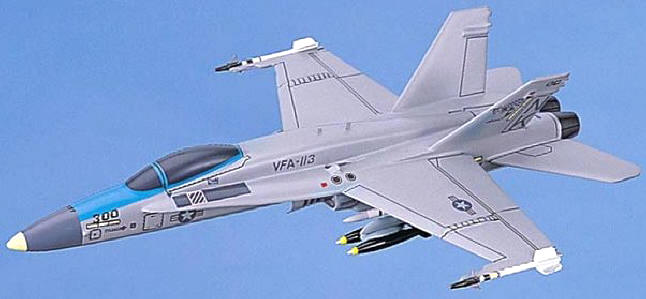
|
F/A-18 Hornet - US Navy
Premier Series. Loaded with weapons. 1/41st scale.
12" wingspan x 16.5" long.
No. AGN4D-P1. Only $194.95 |
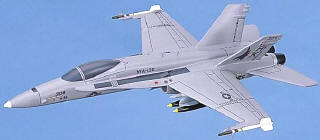 |
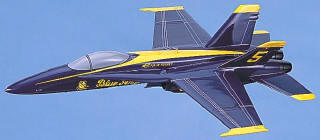 |
F/A-18 Hornet -
US Marines
Premier Series. Loaded. Same size as above.
No. AGN4D-P2. Only $194.95 |
F/A -18 Hornet
"Blue Angles"
Premier Series.
No. AGN4D-P3. Only $194.95 |
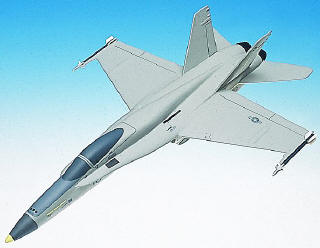 |
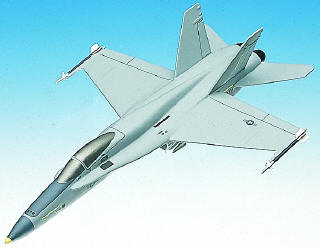 |
F/A-18 Hornet -
US Navy
Standard Series. 1/48th scale.
10.25" wingspan x 14" long.
No. AGN4D-S1. Only $109.95 |
F/A-18 Hornet -
US Marines
Standard Series. 1/48th scale.
10.25" wingspan x 14" long.
No. AGN4D-S2. Only $109.95 |
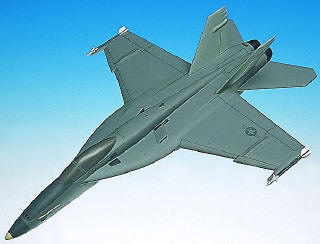 |
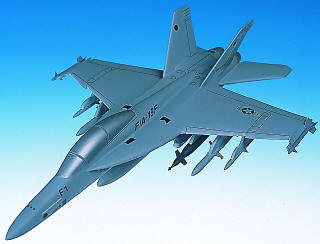 |
F/A-18 Super
Hornet - US Navy
Standard Series. 1/48th scale.
11.5" wingspan x 15" long.
No. AGN4D-S4. Only $129.95 |
FA-18F Super
Hornet
Standard Series. 1/48th scale.
10.25" wingspan x 14" long.
No. AGN4D-S5. Only $129.95 |
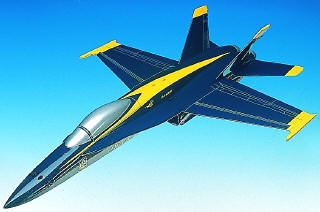 |
F/A-18A Hornet "Blue
Angles"
Deluxe Series. 1/40th scale.
12" wingspan x 17.25" long.
No. AGN4D-DX. Only $149.95
F/A-18A
Hornet "Blue Angles"
Standard Series. 1/48th scale.
No. AGN4D-S3. Only $109.95 |
|
|
